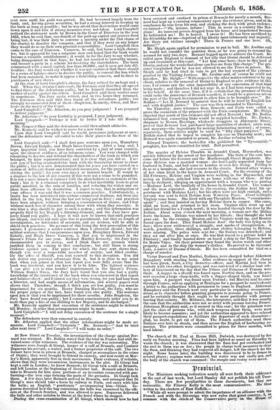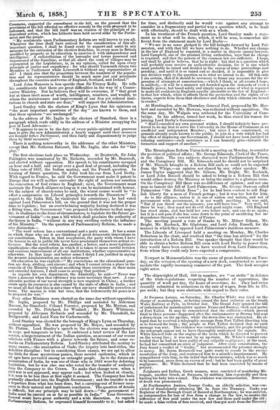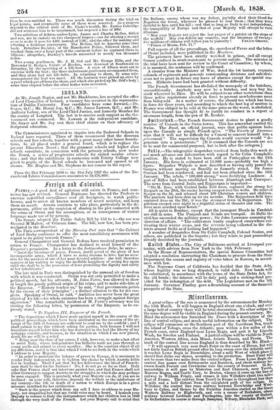The Ministers seeking reelection nearly all sent forth their addresses
at the end of last week, but Lord Stanley did not publish his till Tues- day. There are few peculiarities in these documents, but they are noticeable. Sir Fitzroy? Kelly is the most communicative. He thus writes to the electors of FAA Suffolk- " While all were prompt to admit the importance of an Alliance with the French and with the Sovereign who now rules that grad country, I, common with the chiefs of the Conservative party in the House of Commons, supported the amendment to the bill, on the ground that the provisions of the bill afforded no effective remedy to the evils ptoposed to be redressed, and that the bill itself was an evasion of the principle of in- dependent action, which has hitherto been held sacred alike by the Parlia- ment and the people. "My sentiments upon Parliamentary Reform are well known to you all. Whenever the time shall have arrived for the consideration of this all- important question I shall be found ready to support and egoist in any measure for the extension of the elective franchise, to every man in Britain qualified by property or by education to exercise it with independence and intelligence. A redistribution of the boroughs and towns possessed and finpossessed of the franchise, so that all above the rank of villages may be represented in the Legislature, is, in my opinion, called for upon every manciple of justice and expediency : for why should Yarmouth return two Members to Parliament while Lowestoft is without any representative at all ? I think also that the proportion between the numbers of the popula- tion and its representatives should be much more just and proximate throughout the counties and towns of England, Scotland, and Ireland."
Lord John Manners is less specific than Sir Fitzroy Kelly. He tells his constituents that there are great difficulties in the way of a Conser- vative Ministry. But he believes they will be overcome, if " that great but at times inert mass of worth, intelligence, numbers, and wealth, to whom the maintenance and improvement of our free yet ordered insti- tutions in church and state are dear," will support the Administration.
Lord Stanley tells the electors of King's Lynn that his opinions on "the most important questions of the day" are known to them, and that those opinions "are unchanged."
In the address of Mr. Inglis to the electors of Stamford, there is a paragraph which reads oddly in the address of a Minister occupying the post of Lord Advocate-
" It appears to me to be the duty of every public-spirited and generous man to give the new Administration a hearty support until their measures are brought before Parliament, and then fairly and dispassionately to judge them by their measures."
There is nothing noteworthy in the addresses of the other Ministers, except that Mr. Sotheron Esteourt, like Mr. Inglis, also asks for "fair play."
The first elections took place on Wednesday. At Droitwich, Sir John Takington was nominated by Mr. Ricketts, seconded by Mr. Bearcroft, and elected without opposition. His speech to his constituents occupied an hour and a half, and swept over a good deal of ground, including the China vote of 1857, the Indian mutiny, and the French question. In treating of future questions, Sir John took his cue from Lord Derby. With regard to France, he said the Government must make it patent to Europe that we will neither surrender the right of asylum nor sanction the concoction of foul crimes in England ; next, the Government must maintain the French alliance so long as it can be maintained with honour. -On the subject of church-rates he said, the wisest course would be "to effect a compromise on Liberal principles towards the Dissenters." In regard to the India Bill, he vindicated his consistency ; he had voted against Lord Palmerston's bill, on the ground that it was not the proper thee to legislate ; but an overwhelming majority having declared it was a fitting time, the Government "are prepared in obedience to that major- ity, in obedience to the force Of circumstances, to legislate for the future go- vernment of India"—to pass a bill which shall proclaim the authority of the Queen in India, "without in any way swelling unduly the influence of the Ministry." On the question of Parliamentary Reform, he made a nice distinction- " The word reform has a conventional and a party sense. It has a sense in which those who use it are thinking of great democratic innovations in our constitution. Taken in that acceptation, the party with whom I have the honour to act in public life never have proclaimed themselves ardent re- formers. But the word reform has another, a better, and a more legitimate signification—the signification in which it is taken to mean careful revision and cautious improvement of all our institutions., whether representative or otherwise. In that large and better sense I think I am justified in saying the present Administration are ardent reformers."
On education he was explicit—" My convictions on the edueationalques- tion are deep, abiding, and sincere ; and when I cannot retain a place in the councils of theMinistry without sacrificing those convictions in their main and essential features, I shall cease to occupy that position." As regards his own department, the Admiralty, he said—" Never was there a moment when that efficiency was more necessary than now. A con- siderable portion of our naval strength is now required in China ; a further strain upon its resources is also caused by the state of affairs in India ; and we must all feel that this is not a time when our navy should be powerless at home. The maxim is trite but true, that the best security for peace is to be prepared for war."
Four. other Ministers were elected on the same day without opposition. Mr. Inglis, proposed by Mr. Phillips and seconded by Alderman Hanson, for Stamford ; Colonel Forester, proposed by Mr. Mytton, and seconded by Mr. Pritchard, for Wenkck ; Mr. Henry Whitmore, proposed by Alderman Richards and seconded by Mr. Thurslield, for Bridgenorth ; and Lord Naas for Cockermouth.
Lord Stanley was elected for the borough of King's Lynn on Thursday, without opposition. He was proposed by Mr. Moyse, and seconded by Mr. Platten. Lord Stanley's speech to the electors was comprehensive in scope and temperate in tone. It embraced a brief review of he last session, a large treatment of the Indian question, an account of our recent relations with France with a glance towards the future, and some re- marks on Parliamentary Reform. Lord Stanley attributed the mutiny to many causes —the annexation of Oude, the inquiry into land-titles, the defective discipline: but in considering these causes, we are apt to allow too little for those mysterious panics, those mental epidemics, which in all ages have prevailed among an untaught people. As to the future ad- ministration of India, he was one of those who in 1853 were for deferring legislation, but he was also one who voted for the transfer of authority from the Company to the Crown. To make that change now, when a civil war is not appeased, may appear rash ; but when looked at closely, it is seen to be less than at first sight it seemed. The Company has been gradually absorbed into the English Government ; and the transfer is not a departure from what has been done, but a carrying-out of former mea- sures to their natural and legitimate conclusion. The question of details IS difficult, but one principle may be laid down—" the government of India must be carried on as far as possible in India." Your Governor- General must have great authority and a wide discretion. As regards Parliamentary Reform, he expressed himself favourable to it ; but wilted
for time, and distinctly said he would vote against any attempt to consider in a fragmentary and partial way a question which, to be dealt with effectually, should be dealt with as a whole.
In his treatment of the French question, Lord Stanley made a state- ment as to what will be done, which, it will be seen, is somewhat dif- ferent from the statement made by Lord Derby-
" We are in no sense pledged to the bill brought forward by Lord Pal- merston, and with that bill we have nothing to do. Whether any change in the law of England be required, is a matter in dispute among lawyers. Lord Campbell, one of the greatest living authorities, says that no change is required, and that the powers of the common law are sufficient. I hope, and shall be glad to believe, that he is right : but that is a question which will probably soon receive an authoritative decision, for it is one which must probably be raised and decided in the course of some proceedings now pending.; and until it is so raised and so decided, it is impossible to give any decisive reply to the question as to what we intend to do. Of this only I am certain, that if it should be necessary to frame any measure for the re- pression of attempts at assassination,—which I think, at all events I hope, is unlikely,—it will be a measure not founded upon the demands of even a friendly power, but based solely and simply upon a sense of what is required to make-all residents in England equally amenable to the law of England— to that law which, while it affords them the protection and the rights of ci- tizens, expects from them that obedience and duty which citizens are bound to render.'
At Huntingdon, also on Thursday, General Peel, proposed by Mr. Her- bert and seconded by Mr. Howson, was reelected without opposition. On the same day, Mr. Walpole was reelected for the University of Cam- bridge. In his address, issued last week, he thus stated his reason for joining Lord Derby's Government— . "Had I consulted my own personal wishes, I should infinitely have pre- ferred to do my best to serve the University in the House of Commons as an unofficial and independent Member ; but since I was constrained, on grounds already made known to the public to join in a vote which has hail
the effect of displacing one Government, public, not have been justified in refusing assistance—such assistance as I can honestly give—towards the formation and support of another."
The Birmingham Reform Union held a meeting on Monday, to consider the position of political affairs ; Mr. George Edmonds, Clerk of the Peace, in the chair. The two subjects discussed were Parliamentary Reform and the Conspiracy Bill. Mr. Edmonds said he should not be surprised if Mr. Disraeli brought in a Reform Bill such as could not be expected from the Whigs,—an opinion not shared by any other speaker. Mr. James Taylor suggested that Mr. Gibson, Mr. Bright, Mr. Roebuck, or Lord John Russell should be asked to bring in a Reform Bill that would either destroy the Ministry or bring the matter to a glorious issue. On the Conspiracy Bill there was no difference of opinion ; and not one man to lament the fall of Lord Palmerston. Mr. George Dawson called Palmerston "the British Esau" ; for he had been content to sell Eng- lish liberty for a mess of French pottage ; but it was too hot for him.
As to the alliance, unless it is one of nation and nation' and not of government with government, it is not worth anything. It was said, "But if you throw out the measure, you will have war.' Very well, let there be war ; they must not do evil that good might come. Old England has stood alone, and has held her own before now, and can do so again ; but it is a sad pass if she has come down to the point of sacrificing her in- dependence through a coward fear of France.
The meeting passed a vote of thanks to Mr. Milner Gibson, Mr. Bright, Mr. Roebuck, Mr. Gladstone, and Lord John Russell, for the manner in which they opposed Lord Palmerston's insidious measure.
The Liberals of Liverpool held a meeting on Monday, Mr. Charles Robertson in the chair, and resolved that "the time has arrived" for the introduction of a Reform Bill. One speaker thought that they would be able to obtain a better Reform Bill even with Lord Derby in power than they would have been content to have received from Lord Palmerston, from whom they could only have expected a compromise.
Newport in Moiunouthshire was the scene of great festivities on Tues- day, on the ocadsion of the opening of anew dock, constructed to accom- modate the rapidly-increasing commerce of the port. The dock occupies eight acres.
The shipvrrightd of Hull, 500 in number, are "on strike" in defence of the trade 'regulations respecting the number of apprentices, the quantity of work per day, the hours of over-time, &e. They had twice recently submitted to reductions in the rate of wages, from 338. to 27s. per week ; but they were obstinate with regard to their rules.
At Swansea Assizes, on Saturday, Mr. Charles White was tried on the charge of manslaughter, as having caused the fatal collision on the South Wales Railway at Pyle, in October last. The Grand Jury ignored the bill of indictment for manslaughter against Evans and Burney, clerk and porter at Port Talbot. It may be remembered that the collision—which proved fatal to three persons—happened after the stationmaster at Stormy had sent a down-train on the up-line, while the down-line was obstructed. He al- leged that he received a telegraphic message from Port Talbot directing him so to forward the train ; the people at Port Talbot declared that no such message was sent. The evidence was contradictory, and the people working the telegraph appear not to have thoroughly understood the signals. Mr. White himself rode on the engine of the train which he directed to proceed on the wrong line' it was met by an up-train. Mr. White's counsel con- tended that he had not been guilty of any culpable negligence ; at the most, he had but committed an error of judgment. After some consultation, the Jury found a verdict of " Guilty, ' but recommended the prisoner strongly to mercy. Mr. Baron Bramwell was quite ready to accede to the recom- mendation of the Jury, and sentenced him to a month's imprisonment. He sympathized with him, in the belief that the occurrence which was so much to be lamented, arose from an excess of zeal : but he had been guilty of great negligence. Mr. White declared that he had been convicted by means of perjury.
Zelphanta and Italius, Greek seamen, were convicted of murdering ?di- tropani, another Greek, at Swansea, by stabbing him repeatedly and then hurling his body into a canal. The evidence was circumstantial. Sentence of death was pronounced.
At Northampton Assizes, George Cooke, an elderly solicitor, was con- victed of fraudulently obtaining 381. 3s. from the Treasury. Cooke was Registrar of the Borough Court of Record at Northampton ; he YAW entitled, as compensation for loss of fees from a change in the law, to receive the difference of fees paid under the new law and those paid under the old ; he made a false return of fees received, and thus got more from the Treasury
than he was entitled to. There was much discussion during the trial on legal points, and eventually some of these were reserved. As a surgeon deposed to the critical state of Mr. Cooke's health, Mr. Justice Coleridge did not sentence him to be imprisoned, but imposed a fine of 200/. Two solicitors of Ashton-under-Lyne, James and Charles Mellor, father and son, are in custody on two charges of forgery—one for altering a receipt so as to make it pass for 4501. instead of 1501., and the other for making and ttering a fictitious conveyance. The Mellon fled to America some time back. Detective Buckley, of the Manchester Police, followed them, and tracked them over a large part of the continent before he captured them in Illinois : altogether, Buckley's travels amounted to nearly ten thousand miles.
Two young gentlemen, Mr: J. H. Ord and Mr. George Ellis, and the Reverend G. Hodges, Curate of Reydon, were drowned at Southwold on Saturday, by the upsetting of a life-boat. A crew of fifteen went out to exercise with the beat; the three unfortunate gentlemen accompanied them, and they alone had not life-belts. In returning to shore, by some mis- management the boat was upset: All the boatmen were picked up alive by a yawl which put off from the shore, and which also picked up Mr. Ord's body ; some time elapsed before the other bodies were recovered.




































 Previous page
Previous page